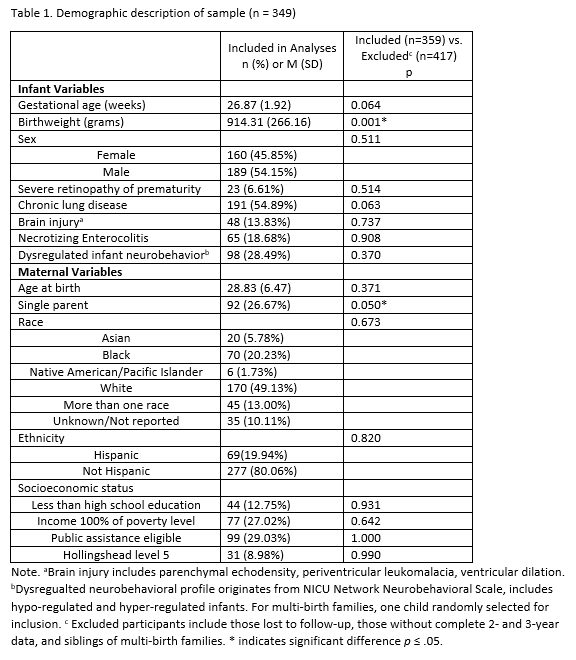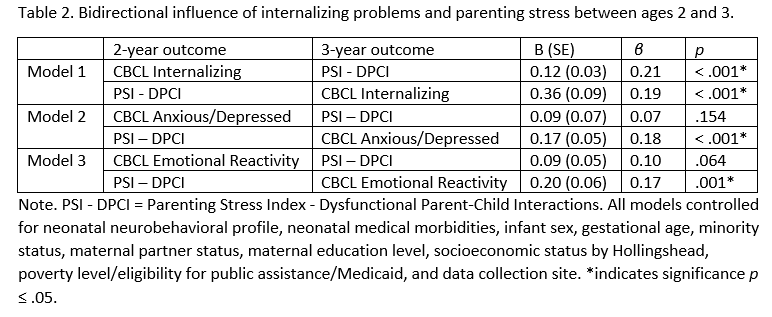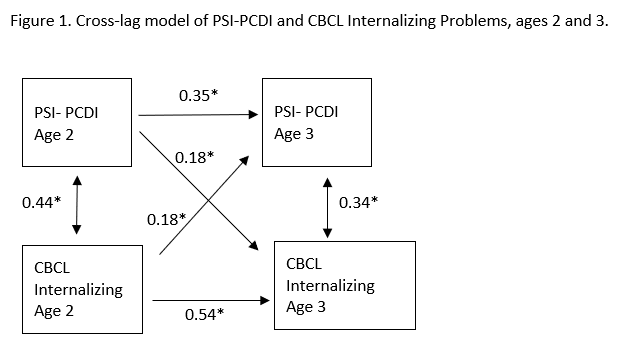Developmental and Behavioral Pediatrics
Session: Developmental and Behavioral Pediatrics 1: Parenting and Behavior
387 - Bidirectional Associations of Parenting Stress and Child Emotional Problems in Very Preterm Infants
Friday, May 3, 2024
5:15 PM - 7:15 PM ET
Poster Number: 387
Publication Number: 387.233
Publication Number: 387.233

Coral Shuster, PhD (she/her/hers)
Biostatistician
Women & Infants Hospital of Rhode Island
Medina, Ohio, United States
Presenting Author(s)
Background: Infants born very preterm (VPT; < 32 weeks gestational age) have increased risk of long-term emotional problems compared to term infants and mothers of VPT infants are prone to experiencing higher levels of stress. Parenting stress and child behavior problems are bidirectionally associated, but little research has investigated bidirectional associations between parenting stress and emotional problems, specifically among infants born VPT.
Objective: To examine bidirectional associations between parenting stress and child emotional problems at ages 2 and 3 among infants born preterm.
Design/Methods: The Neonatal neurobehavior and Outcomes in Very preterm Infants (NOVI) study enrolled 704 VPT infants. Families were included in analyses if mothers completed the Parenting Stress Index (PSI) about their own perceptions of parenting stress and the Child Behavior Checklist (CBCL) at both the 2- and 3-year follow-up. One child was randomly selected for families with multiple children, resulting in an analytic sample of 349 participants. Cross-lagged models examined associations between three CBCL subscales for child emotional problems and the PSI dysfunctional parent-child interactions scale (PSI-DPCI) between ages 2 and 3 years, adjusted for demographics covariates.
Results: Adjusted models controlled for newborn neurobehavior, medical morbidities, infant sex and gestational age, maternal minority status, partner status, education level, eligibility for public assistance, socioeconomic status, and data collection site. PSI-DPCI and CBCL internalizing problems were bidirectionally associated (p < .001). Anxious/depressed syndrome scores at age 2 were not associated with age 3 PSI-DPCI (β = 0.07, p = .154), but PSI-DPCI at age 2 was associated with anxious/depressed syndrome scores at 3 (β = .18, p < .001). Emotional reactivity syndrome scores at age 2 were not associated with age 3 PSI-DPCI (β = 0.10, p = .064), but PSI-DPCI at age 2 was associated with emotional reactivity at age 3 (β- = 0.17, p = .001).
Conclusion(s): Parenting stress at age 2 was associated with poor child emotional health indicated by increased internalizing problems, emotional reactivity, and anxious/depressed symptoms at age 3. Poor child emotional health (reactivity, anxious/depressed) at age 2 was not associated with parenting stress at age 3. Internalizing problems at age 2 were associated with parenting stress at age 3. Providing psychosocial supports to parents during early childhood may decrease stress, minimizing the impact of parenting stress on children’s emotional outcomes.



